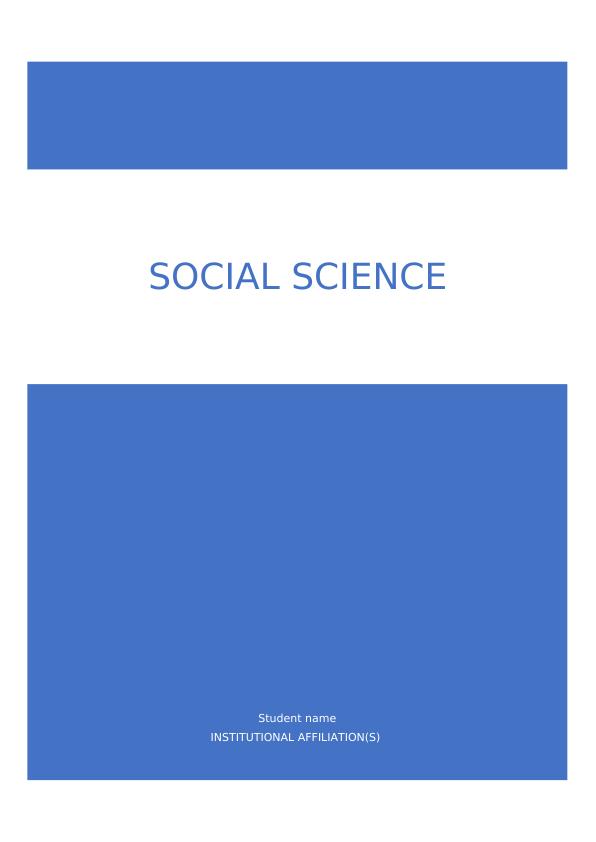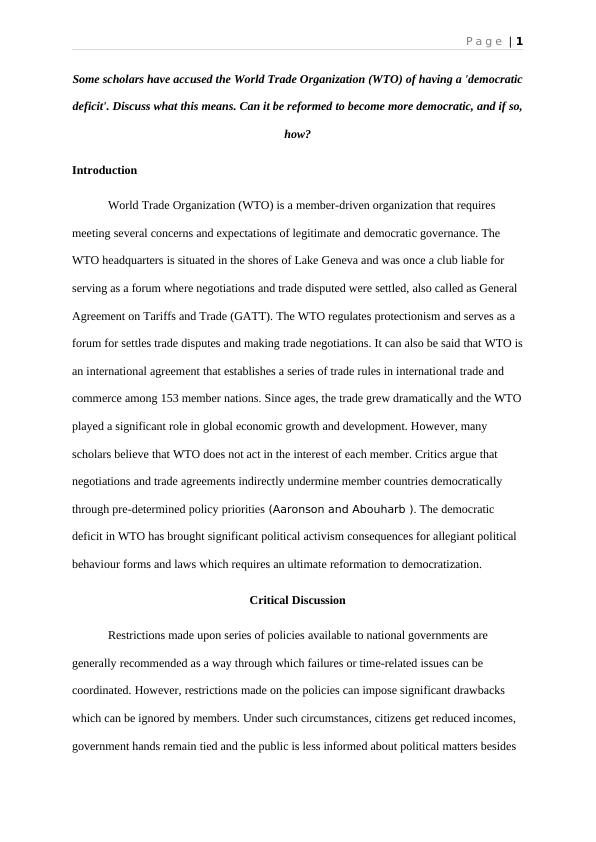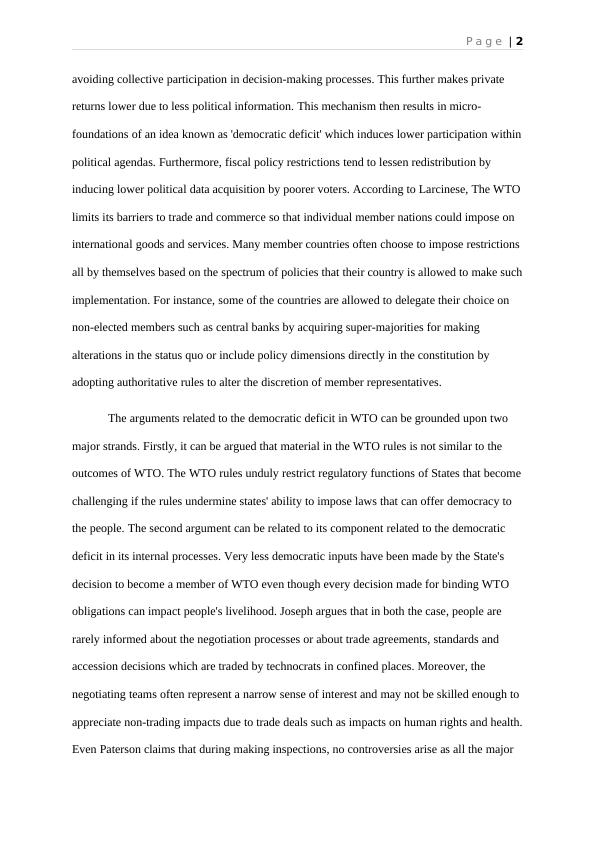World Trade Organization : Democratic deficit
Added on 2022-08-23
7 Pages1877 Words37 Views
Student name
INSTITUTIONAL AFFILIATION(S)
SOCIAL SCIENCE
INSTITUTIONAL AFFILIATION(S)
SOCIAL SCIENCE

P a g e | 1
Some scholars have accused the World Trade Organization (WTO) of having a 'democratic
deficit'. Discuss what this means. Can it be reformed to become more democratic, and if so,
how?
Introduction
World Trade Organization (WTO) is a member-driven organization that requires
meeting several concerns and expectations of legitimate and democratic governance. The
WTO headquarters is situated in the shores of Lake Geneva and was once a club liable for
serving as a forum where negotiations and trade disputed were settled, also called as General
Agreement on Tariffs and Trade (GATT). The WTO regulates protectionism and serves as a
forum for settles trade disputes and making trade negotiations. It can also be said that WTO is
an international agreement that establishes a series of trade rules in international trade and
commerce among 153 member nations. Since ages, the trade grew dramatically and the WTO
played a significant role in global economic growth and development. However, many
scholars believe that WTO does not act in the interest of each member. Critics argue that
negotiations and trade agreements indirectly undermine member countries democratically
through pre-determined policy priorities (Aaronson and Abouharb ). The democratic
deficit in WTO has brought significant political activism consequences for allegiant political
behaviour forms and laws which requires an ultimate reformation to democratization.
Critical Discussion
Restrictions made upon series of policies available to national governments are
generally recommended as a way through which failures or time-related issues can be
coordinated. However, restrictions made on the policies can impose significant drawbacks
which can be ignored by members. Under such circumstances, citizens get reduced incomes,
government hands remain tied and the public is less informed about political matters besides
Some scholars have accused the World Trade Organization (WTO) of having a 'democratic
deficit'. Discuss what this means. Can it be reformed to become more democratic, and if so,
how?
Introduction
World Trade Organization (WTO) is a member-driven organization that requires
meeting several concerns and expectations of legitimate and democratic governance. The
WTO headquarters is situated in the shores of Lake Geneva and was once a club liable for
serving as a forum where negotiations and trade disputed were settled, also called as General
Agreement on Tariffs and Trade (GATT). The WTO regulates protectionism and serves as a
forum for settles trade disputes and making trade negotiations. It can also be said that WTO is
an international agreement that establishes a series of trade rules in international trade and
commerce among 153 member nations. Since ages, the trade grew dramatically and the WTO
played a significant role in global economic growth and development. However, many
scholars believe that WTO does not act in the interest of each member. Critics argue that
negotiations and trade agreements indirectly undermine member countries democratically
through pre-determined policy priorities (Aaronson and Abouharb ). The democratic
deficit in WTO has brought significant political activism consequences for allegiant political
behaviour forms and laws which requires an ultimate reformation to democratization.
Critical Discussion
Restrictions made upon series of policies available to national governments are
generally recommended as a way through which failures or time-related issues can be
coordinated. However, restrictions made on the policies can impose significant drawbacks
which can be ignored by members. Under such circumstances, citizens get reduced incomes,
government hands remain tied and the public is less informed about political matters besides

P a g e | 2
avoiding collective participation in decision-making processes. This further makes private
returns lower due to less political information. This mechanism then results in micro-
foundations of an idea known as 'democratic deficit' which induces lower participation within
political agendas. Furthermore, fiscal policy restrictions tend to lessen redistribution by
inducing lower political data acquisition by poorer voters. According to Larcinese, The WTO
limits its barriers to trade and commerce so that individual member nations could impose on
international goods and services. Many member countries often choose to impose restrictions
all by themselves based on the spectrum of policies that their country is allowed to make such
implementation. For instance, some of the countries are allowed to delegate their choice on
non-elected members such as central banks by acquiring super-majorities for making
alterations in the status quo or include policy dimensions directly in the constitution by
adopting authoritative rules to alter the discretion of member representatives.
The arguments related to the democratic deficit in WTO can be grounded upon two
major strands. Firstly, it can be argued that material in the WTO rules is not similar to the
outcomes of WTO. The WTO rules unduly restrict regulatory functions of States that become
challenging if the rules undermine states' ability to impose laws that can offer democracy to
the people. The second argument can be related to its component related to the democratic
deficit in its internal processes. Very less democratic inputs have been made by the State's
decision to become a member of WTO even though every decision made for binding WTO
obligations can impact people's livelihood. Joseph argues that in both the case, people are
rarely informed about the negotiation processes or about trade agreements, standards and
accession decisions which are traded by technocrats in confined places. Moreover, the
negotiating teams often represent a narrow sense of interest and may not be skilled enough to
appreciate non-trading impacts due to trade deals such as impacts on human rights and health.
Even Paterson claims that during making inspections, no controversies arise as all the major
avoiding collective participation in decision-making processes. This further makes private
returns lower due to less political information. This mechanism then results in micro-
foundations of an idea known as 'democratic deficit' which induces lower participation within
political agendas. Furthermore, fiscal policy restrictions tend to lessen redistribution by
inducing lower political data acquisition by poorer voters. According to Larcinese, The WTO
limits its barriers to trade and commerce so that individual member nations could impose on
international goods and services. Many member countries often choose to impose restrictions
all by themselves based on the spectrum of policies that their country is allowed to make such
implementation. For instance, some of the countries are allowed to delegate their choice on
non-elected members such as central banks by acquiring super-majorities for making
alterations in the status quo or include policy dimensions directly in the constitution by
adopting authoritative rules to alter the discretion of member representatives.
The arguments related to the democratic deficit in WTO can be grounded upon two
major strands. Firstly, it can be argued that material in the WTO rules is not similar to the
outcomes of WTO. The WTO rules unduly restrict regulatory functions of States that become
challenging if the rules undermine states' ability to impose laws that can offer democracy to
the people. The second argument can be related to its component related to the democratic
deficit in its internal processes. Very less democratic inputs have been made by the State's
decision to become a member of WTO even though every decision made for binding WTO
obligations can impact people's livelihood. Joseph argues that in both the case, people are
rarely informed about the negotiation processes or about trade agreements, standards and
accession decisions which are traded by technocrats in confined places. Moreover, the
negotiating teams often represent a narrow sense of interest and may not be skilled enough to
appreciate non-trading impacts due to trade deals such as impacts on human rights and health.
Even Paterson claims that during making inspections, no controversies arise as all the major

End of preview
Want to access all the pages? Upload your documents or become a member.
Related Documents
Report on International Political Economylg...
|16
|3445
|78
Governances, Risk & Compliance.lg...
|16
|4551
|28
Legal Aspects of International Trade and Enterpriselg...
|10
|1231
|56
The UK leaving the EU: WTO agreement or free trade agreement?lg...
|8
|2759
|100
Introducing International Political Economylg...
|10
|2957
|285
WTO Dispute Settlement and Trade Regulationslg...
|12
|3437
|429
